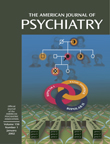To the Editor: In a recent editorial, Jeffrey A. Lieberman, M.D., and Wayne S. Fenton, M.D.
(1), noted that an untreated first episode of psychosis constitutes a major mental health problem and advocated early detection and treatment. There may be several reasons why untreated psychosis is an important public health problem, but the evidence for some of the reasons is debatable. One reason for early detection and intervention, however, raises no questions and is obvious to anyone who has been touched by the illness. Drs. Lieberman and Fenton stated it succinctly: “Untreated psychosis damages lives” (p. 1728).
This “collateral damage” can be extensive and, as Drs. Lieberman and Fenton described, can impose “a significant burden of terror, suffering, and bewilderment on patients and their families” (p. 1728). Specifically, impairments in functioning can disrupt adolescent and young adult development at a crucial and already complex stage of life. Other potentially associated problems involve stigma, embarrassment, isolation, loss of mastery and control, diminution of self-worth, a disrupted educational and/or professional trajectory, a wounded capacity for therapeutic alliance, and a hindered capacity to participate fully in treatment decisions. Research can be very useful in delineating specific ways in which collateral damage evolves and how delays in identification and treatment occur.
Early identification and treatment may reduce this damage. A method that offers the opportunity to treat psychosis immediately at onset is one in which patients are identified in a putatively prodromal phase of the illness and either followed prospectively or enrolled in a clinical treatment or prevention trial. Patients in the Prevention Through Risk Identification Management and Education (PRIME) Research Clinic in New Haven, Conn., are actively symptomatic and have been identified as being at imminent risk for developing schizophrenic psychosis. We monitor them closely and then treat them with antipsychotic medication immediately upon onset of symptoms if they reach psychotic levels of intensity. Thus far 11 patients have converted from a prodromal to a psychotic state and have received treatment at onset.
No patients have required hospitalization as a result of having developed psychosis. All but one continued with intended daily activities of work or school (days absent: mean=0.17, SD=1.12), as well as with long-term plans (e.g., remaining in school, entering college, or maintaining their position in the job hierarchy). All of the patients maintained strong ties and good relationships with their members of their immediate family and sustained their social networks. Overall medication compliance, as measured by mean pill count, was 93% (SD=10), and seven of nine patients have thus far completed treatment.
We are aware that early identification of illness in the prodromal phase is associated with a risk of labeling and possibly stigmatizing patients and can have negative consequences for their social networks and self-esteem. Our experience, however, suggests that this approach may prevent a powerful source of stigma, i.e., untreated and undetected irrational behavior and hospitalization. Our data are clearly anecdotal, and our group was very small, but our clinical experience is compelling enough to share and suggests that preventing collateral damage through early detection and prevention should be an area of active investigation.

